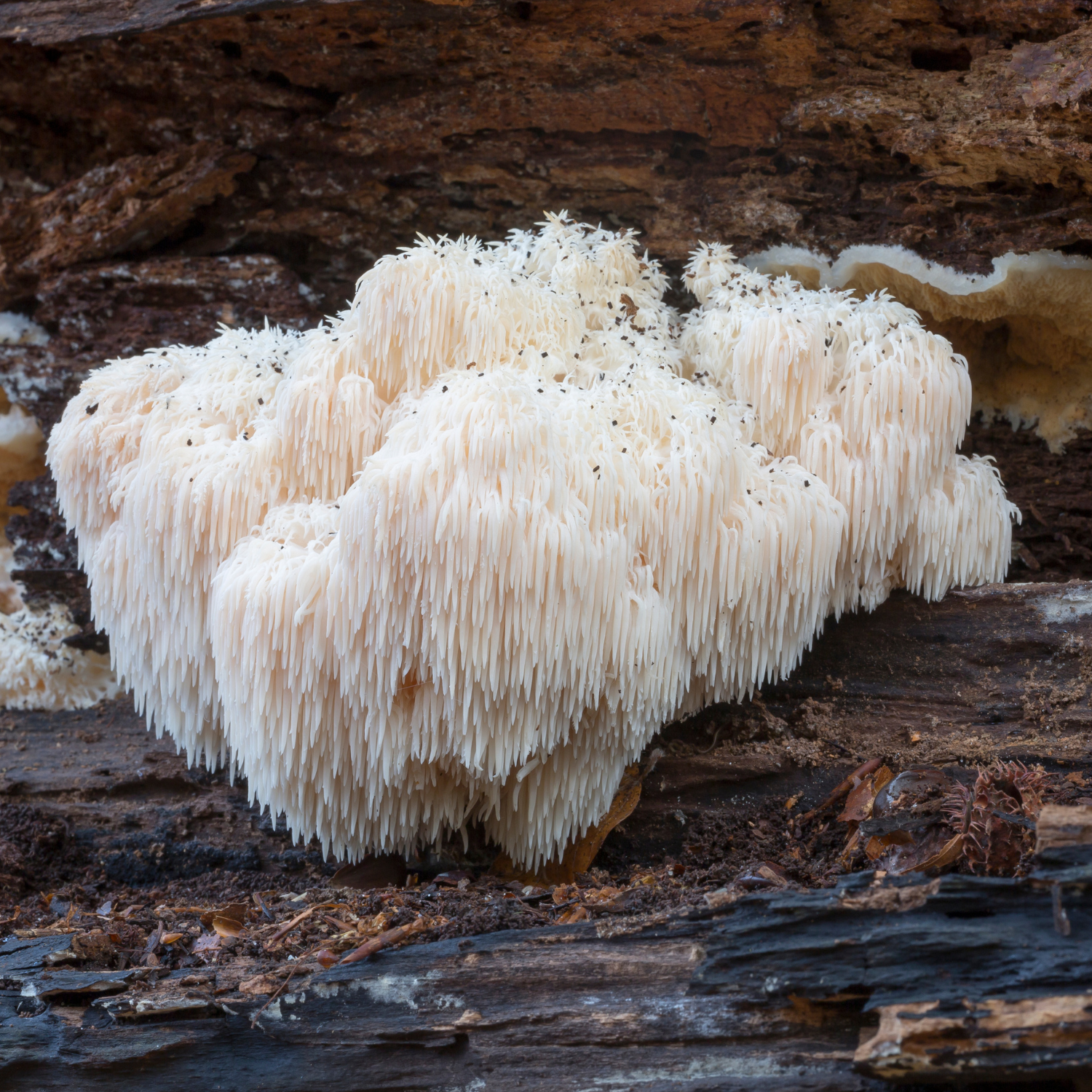Unveiling the Enigmatic Lion's Mane Mushroom
Lion's Mane, scientifically known as Hericium erinaceus, is a mushroom that has captured the imagination of many due to its unique appearance. Instead of the typical mushroom cap and stem, it resembles a cascading waterfall of white strands, earning it charming nicknames like "pom-pom mushroom," "bearded tooth," and "monkey head." But don't be fooled by its whimsical exterior – this unassuming fungus has a lot to offer in terms of health benefits.

Lion's Mane Throughout History
Traditional Uses for Digestive Health
Throughout history, Lion's Mane has been revered for its digestive health benefits. Traditional Chinese medicine practitioners used it to address stomach issues and digestive distress. It was also seen as a general tonic for overall well-being.
In ancient times, Lion's Mane was regarded as a natural remedy for digestive ailments. Traditional Chinese medicine included this remarkable mushroom in treatments aimed at soothing the membranes of the digestive tract. Historical records suggest that Lion's Mane was a trusted ally in relieving stomach problems, which is just one facet of its fascinating history.
Brain Health and Memory Support
Beyond its digestive benefits, Lion's Mane has a rich tradition of use for brain health. Different cultures have recognized its potential to enhance memory, concentration, and overall cognitive function. Some even attributed it to promoting nerve growth and repair, as well as improving mental clarity and focus.
Lion's Mane has always been celebrated for its multifaceted qualities. Historical accounts reveal its recognition as an aid to brain health, with various cultures acknowledging its ability to enhance memory, focus, and cognitive function. These traditional beliefs paved the way for Lion's Mane's current scientific exploration.
The Science Behind Lion's Mane
Lion's Mane's Unique Compounds
Lion's Mane contains two remarkable compounds that set it apart from other mushrooms: Aromatic hericenones and Diterpenoid erinacines. These compounds play a pivotal role in its impressive health benefits.
Lion's Mane's potency lies in its unique compounds, Aromatic hericenones and Diterpenoid erinacines. These compounds, which distinguish it from other mushrooms, form the basis of its remarkable health benefits.
Nurturing Brain Health with Lion's Mane
The Power of Nerve Growth Factor (NGF)
Nerve growth factor (NGF) is a crucial protein in maintaining healthy neurons, but it cannot pass through the blood-brain barrier. Lion's Mane has a unique ability to stimulate the synthesis of NGF, thanks to the erinacines it contains.
Lion's Mane takes brain health to a whole new level by stimulating NGF production. NGF, a vital protein that maintains neurons, cannot typically penetrate the blood-brain barrier. However, Lion's Mane contains erinacines, which unlock this barrier, allowing NGF to flourish within the brain. (1)
Fighting Neurological Diseases
Research has shown that Lion's Mane can potentially reverse and mitigate the effects of neurological diseases like Parkinson's, Alzheimer's, and dementia by promoting NGF production. This impressive feat is one of the mushroom's most celebrated features.
Several studies have proved its potential to support this;
In a study involving 30 older adults grappling with "mild cognitive impairment," participants were divided into two groups. One group received Lion's Mane supplements, while the other received a placebo. The Lion's Mane group outshone the placebo group in cognitive tests conducted at weeks 8, 12, and 16 of the study, suggesting significant cognitive improvement. (2)
Research using PC12 cells, commonly employed to investigate brain health, highlighted Lion's Mane's protective prowess. It seems to shield brain cells from harm and reduce cell death, which is a crucial factor in maintaining cognitive vitality. (3)
Even in individuals without cognitive issues, Lion's Mane supplementation demonstrates the ability to enhance memory. It does this by behaving similarly to brain-derived neurotrophic factor (BDNF), a key player in neuronal adaptability. This natural boost makes learning, memorization, and recall smoother, contributing to an overall sharper mind. (4)
Lion's Mane's potential to combat neurological diseases like Parkinson's, Alzheimer's, and dementia is grounded in its ability to boost NGF production. This remarkable capability holds the promise of transforming the way we approach these challenging conditions.

Lion's Mane as a Nootropic
Nootropic Properties
Lion's Mane is often considered a natural nootropic (5), which are substances known for enhancing brain function. Unlike some nootropics, Lion's Mane offers cognitive enhancement without the side effects or crashes.
Lion's Mane emerges as a natural nootropic, offering a safe and effective means to enhance cognitive function without the typical side effects associated with nootropic substances. Its ability to improve memory, focus, and learning makes it a favoured choice among those seeking cognitive enhancement.
Improved Focus and Productivity
Many users report heightened focus and productivity when supplementing with Lion's Mane. It has the potential to address the root causes of brain fog, making it a favourite among those looking to boost their productivity without the buzz or jitters.
Lion's Mane, renowned for its ability to improve focus and productivity, can counter the common issue of brain fog without the adverse effects often associated with productivity-boosting substances. It has become a go-to choice for those seeking a clear mind and enhanced performance.
Lion's Mane and Mood Enhancement
Lion's Mane may not only enhance memory but also improve mood. Its extracts show promise in regenerating cells in the brain's emotional response centre, the hippocampus, which can potentially alleviate symptoms of anxiety and depression.
In addition to its memory-enhancing abilities, Lion's Mane has the potential to improve mood. By regenerating cells in the hippocampus, the brain's emotional control centre, Lion's Mane offers hope for those battling anxiety and depression.
In a four-week trial which involved a group of 30 post-menopausal women found that cookies made with Lion’s Mane were more effective than the placebo cookies for reducing anxiety and irritability. (6)

Lion's Mane's Impact on Gut Health
Supporting Gut Health
Lion's Mane's benefits extend to the gut, where nearly 70% of the immune system resides. It can reverse gut inflammation and maintain a strong intestinal barrier, thereby promoting overall immune health.
The impact of Lion's Mane isn't limited to brain health. It also extends to gut health, a crucial component of the immune system. By addressing gut inflammation and fortifying the intestinal barrier, Lion's Mane contributes to overall immune well-being.
Fighting Gastric Ulcers
Research supports the traditional use of Lion's Mane in treating gastric ulcers. Studies have shown that it can help reduce the size of these ulcers.
This one of many studies which show treating gastric ulcers with Lion's Mane appears to reduce their size. (7) The reason being is by Increasing antioxidant activity you protect the gastric mucosal lining from damage preventing the growth of H. pylori, commonly associated with ulcer formation.
Lion's Mane, with its roots in traditional medicine, offers a potential solution for gastric ulcers. Scientific research confirms its effectiveness in reducing the size of these painful ulcers, aligning with historical wisdom.

Lion's Mane and Nerve Health
Lion's Mane has demonstrated potential in aiding recovery from nerve injuries, nerve pain (neuropathy), and strokes. It supports the development of protective myelin sheaths around nerves and promotes healthy nerve cell growth. For example in one study Lion's Mane extract was able to speed up development of the protective myelin sheath around nerves in cultured brain cells while promoting "normal" cell growth. (8)
Lion's Mane's positive impact on nerve health is a fascinating dimension of its potential. Its ability to enhance nerve recovery, alleviate neuropathy, and aid stroke recovery is backed by scientific findings, offering hope to those in need of neural support.
Lion's Mane and Longevity
Oxidative stress and shortening telomeres are key factors in aging. Lion's Mane's antioxidant properties and ability to regulate telomerase make it a potential player in promoting longevity and a healthier life.
The quest for longevity has led to a closer examination of Lion's Mane. Its antioxidant properties and influence on telomerase regulation are exciting elements in the pursuit of a longer, healthier life.

Choosing the Right Lion's Mane Supplement
Selecting the right Lion's Mane supplement is vital for reaping its full benefits. To ensure the highest quality:
- Look for Pure Extracts: Opt for supplements made from pure Lion's Mane mushroom or mycelium. Avoid those with artificial ingredients, binders, fillers, grains, and starches.
- Check Beta-Glucan Content: A quality supplement should specify its beta-glucan content, a key medicinal compound in Lion's Mane.
- Avoid Misleading Labels: Beware of labels that hide the use of myceliated grain and other fillers, making it difficult to distinguish the product's true composition.
The Lion's Mane Mushroom - A Marvel of Nature
By selecting the right Lion's Mane supplement, you can embark on a journey towards better health, longevity, and a brighter future.
Our Organic Lions Mane mushrooms extracts are made from 100% mushroom fruiting body- with each extract scientifically verified for active compounds.
This vegan, gluten-free, and non-GMO product guarantees over 30% Beta-glucans, free from added starch, mycelium, or grains.



